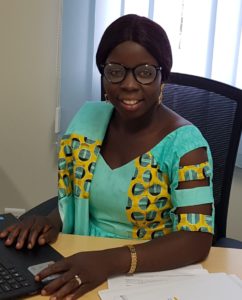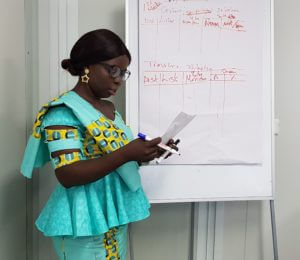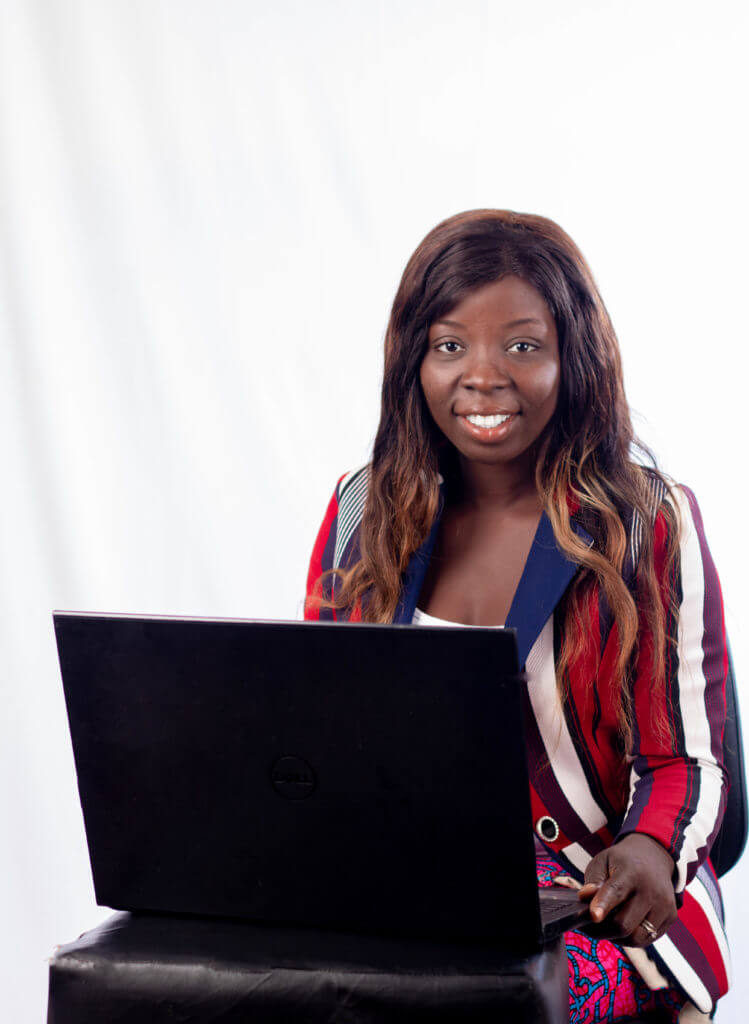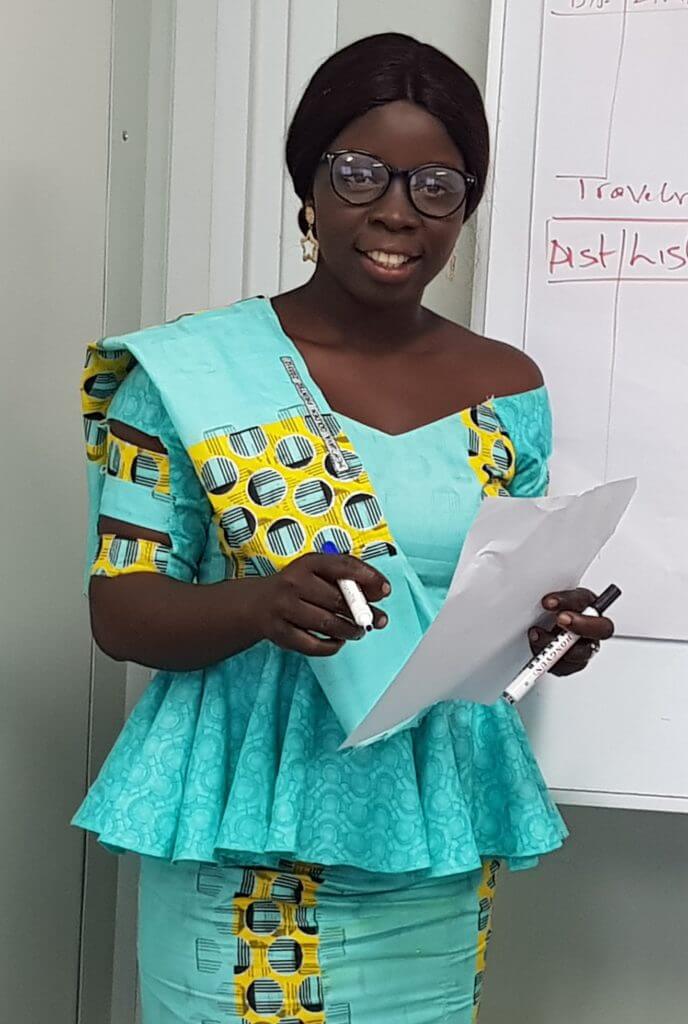Guest post by Isha Sesay, 2020-2021 Emerging Leader of Sierra Leone
Editor’s note: Isha Sesay’s guest post is part of our series, Emerging Leader Voices, which invites TechWomen Emerging Leaders to share their voice, perspective and experiences with the TechWomen community.
How it all started
Growing up in a rural poor community in Sierra Leone, I saw people dying from common diseases like malaria, measles and other vaccine-preventable diseases, especially women and children. And as I pursued my education, I kept asking myself how I could contribute to reducing deaths and suffering from these preventable diseases among vulnerable people. This motivated me to develop a passion for science during my primary and secondary school educational levels. After completing my secondary education, I made a difficult choice to do a bachelor’s degree in public health instead of the other health sciences courses, because of my passion for helping my community in combating preventable causes of death and suffering. This is why I had so much interest in STEM — I wanted to achieve my childhood dreams of being a leader and mentor to champion public health interventions in my community.
As a public health student at university eight years ago, this childhood dream looked far-fetched. Public health was still a relatively new and developing profession among the health sciences, and getting into the government scheme of service is more difficult compared to medical doctors, nurses and other clinical sciences. This is in addition to high unemployment rate in Sierra Leone, where 90% of the workforce is employed in the public sector due to the poorly developed private sector. Looking at these challenges ahead of me I never thought I would become a mentor, passing on public health knowledge and skills to my colleagues, especially my fellow women. Nonetheless, I was determined to achieve this dream against all odds. I was especially encouraged by my classmates who during group studies appreciated the leading roles I took to explain what we learnt in class before examination.
health was still a relatively new and developing profession among the health sciences, and getting into the government scheme of service is more difficult compared to medical doctors, nurses and other clinical sciences. This is in addition to high unemployment rate in Sierra Leone, where 90% of the workforce is employed in the public sector due to the poorly developed private sector. Looking at these challenges ahead of me I never thought I would become a mentor, passing on public health knowledge and skills to my colleagues, especially my fellow women. Nonetheless, I was determined to achieve this dream against all odds. I was especially encouraged by my classmates who during group studies appreciated the leading roles I took to explain what we learnt in class before examination.
Becoming a mentor
 During the 2014 Ebola outbreak, I was supporting surveillance pillar on case investigation, active case search, contact tracing, collecting daily life and death alerts from all districts for the Directorate of Disease Prevention and control (DDPC). In early 2016, after the Ebola outbreak, the Field Epidemiology Training Program (FETP) was introduced in Sierra Leone by the Ministry of Health and Sanitation (MoHS) with support from the U.S. Center for Disease Control and Prevention (CDC) as an in-service training program that aims to strengthen the country’s capacity in epidemiology, surveillance, and outbreak response, to ensure a well-functioning public health system for disease prevention and control.
During the 2014 Ebola outbreak, I was supporting surveillance pillar on case investigation, active case search, contact tracing, collecting daily life and death alerts from all districts for the Directorate of Disease Prevention and control (DDPC). In early 2016, after the Ebola outbreak, the Field Epidemiology Training Program (FETP) was introduced in Sierra Leone by the Ministry of Health and Sanitation (MoHS) with support from the U.S. Center for Disease Control and Prevention (CDC) as an in-service training program that aims to strengthen the country’s capacity in epidemiology, surveillance, and outbreak response, to ensure a well-functioning public health system for disease prevention and control.
After graduation from the university. I searched for a job in my field but to no avail — about 85% of the jobs are occupied by men. Fortunately, I received a call from the director of the DDPC. It was like miracle from heaven hearing that news. Because of my dedication and performance among the females in the 2014 Ebola outbreak response, I was selected to be trained in the fourth cohort of the FETP frontline. As a result of my excellent performance during the frontline FETP, I was again selected to be train in the first cohort of intermediate FETP. Upon graduation from the intermediate program, I was appointed as national mentor to support the frontline FETP program in Sierra Leone.
Mentoring in the FETP
So far I have participated in conducting training and field mentorship of three cohorts of frontline that has graduated 75 field epidemiologists, 15 of which were directly mentored by me. My role as a mentor is to provide in-class training workshops on epidemiological concepts including, public health surveillance, data analysis, outbreak investigations, scientific writing and on the job field mentorship of the participants on projects related to their work and also strengthening their skills and competencies.
Now TechWomen
I heard about the TechWomen program from Doris Bah, a woman I call my mentor, my icon who has inspired many women in our community and the county at large. She was selected for the 2019 cohort. Immediately after, she told me about this dream-fulfilling program, I went to the TechWomen website to get more insight and found out that it was a life-changing opportunity which every woman would dream of. So she guided me throughout the application process. The most exciting part of it is that the program aims at empowering women engaging in STEM.
When I received the email notifying me that I had been selected, I screamed with so much joy. I called my husband, family and Doris to share the good news. The following day I reflected on what my colleagues were telling me in the university — that I will one day be taken to a place where I would improve my mentorship skills to empower other people, especially women.
Being a TechWomen fellow is worth celebrating because it has the potential to put my name on the map of potential leaders in STEM as I help other women grow in society.
I plan to support other women to be self-dependent using my mentorship skills and knowledge gained from the program to gain entrepreneurship skills to improve their livelihoods. I would also contribute to raising awareness on preventable diseases affecting women and children.




Speak Your Mind